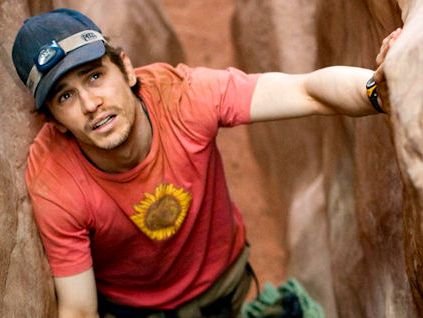Those of you who tuned in to Sunday's Academy Awards probably had less-than-positive reactions to co-host James Franco's "performance" during the ceremony.
Whether his half-hearted delivery was because of missed rehearsals (he opted to go to his classes at Yale instead) or it was someone's idea of a stunt, Franco's on-stage behavior drew too much attention away from what people should have been watching him for: his Best Actor nomination-worthy work in "127 Hours."
Completely on the other side of the acting spectrum from his hosting bit, Franco's performance in the film covers a full range of human emotion and elicits real empathy from its audience.
"127 Hours" is a dramatic retelling of mountain climber Aron Ralston's actual experiences trapped in a Utah canyon for five days.
Danny Boyle, who won an Oscar in 2009 for directing "Slumdog Millionaire," both directed and co-wrote the screenplay, adapted from Ralston's written account and the actual video footage taken during his time in the canyon.
I was skeptical as to how a feature-length film could pull off a story focused on one guy, but the solution is what really makes "127 Hours" as moving as it is.
The film does a great job of putting you into Ralston's head with a mix of flashbacks and hallucination/dream sequences, but the real connection is made in the "fourth wall"-breaking combination of first person video diary scenes and Franco's ability to convey the frustration, remorse and determination of his character.
It's this emotional tie between character and audience, I think, that really makes the film's climax so gut-wrenching. I've sat through my fair share of plotless gore-nography and never felt more than a twinge, but I couldn't bring myself to watch this without pausing for a breather.
Deciding to make this scene so graphic and unrelenting is a point of contention, but as someone who was so affected I can say that the scene and its method were necessary. Everything about "127 Hours" is anchored in the realism of Ralston's trial, and it would be insincere to cut away from the climax of his determination.
"127 Hours" is unique in this respect because it is so raw and personal. It's an incredible story that tackles the "triumph over adversity" model without being pretentious or falling into overdone cliches. Yes, the end of Ralston's time in the canyon is explicit, but it's nowhere near enough to make a case against seeing the film.
Contrary to her natural state of being, Renee Lorenz is a total optimist when it comes to Milwaukee. Since beginning her career with OnMilwaukee.com, her occasional forays into the awesomeness that is the Brew City have turned into an overwhelming desire to discover anything and everything that's new, fun or just ... "different."
Expect her random musings to cover both the new and "new-to-her" aspects of Miltown goings-on, in addition to periodically straying completely off-topic, which usually manifests itself in the form of an obscure movie reference.




